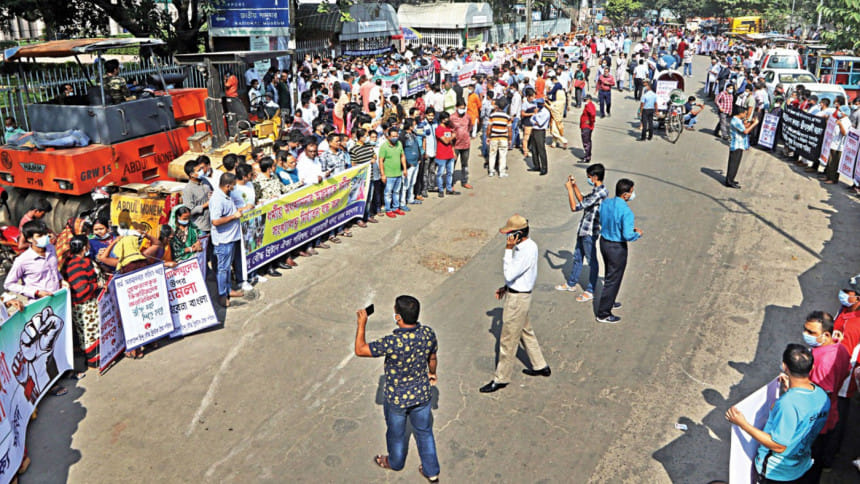Bigotry has no place in a civilised society

In an article published on April 4, 2015, I wrote that "Attacks on Hindus and their property have demonstrated the immensely sad but blunt reality that even after 42 years of democratic pluralistic existence, the religious minority of Bangladesh have not been able to save themselves" (The Daily Star). The threat to the minority group and their properties, unfortunately, continues to this day, as evidenced by a recent attack on the Hindu population and their properties in Muradnagar of Cumilla district, or the harassment and detention of a Hindu girl in Parbatipur over alleged comments made in response to a Facebook post, or the threat to a Hindu teacher of Chittagong University. Another recent example of religious intolerance was seen in Patgram, where a man was burnt alive by an angry mob on unsubstantiated suspicion of desecration of the holy Quran. This time, the victim was a Muslim.
While prompt administrative actions have been taken by the authorities following the incidents, it has been a painful experience to witness such savagery by a section of the people. In fact, the tolerance threshold of some people has sunken so low that it is becoming increasingly difficult to ensure peaceful coexistence of people of different faiths and belief systems. We have to admit that in some areas at least, it was zealotry at its worst.
The overtly communal and extremist contour of the incidents cited above indicates that the ethos of a democratic society based on dignity and equal rights—the very hallmarks of the pluralistic society espoused by our founding fathers—have not taken firm root yet. This is sad, to say the least. Inflaming communal passions to harass and marginalise religious minorities is clearly antithetical to the spirits of both our Constitution and the Liberation War.
Historically speaking, we have a responsibility to firmly establish our democratic and secular credentials because the Pakistani rulers, who we fought and defeated in the 1971 war, used to think of Bengali Muslims as lesser Muslims because of our Bengali identity. The establishment policy was to harp on the "Islam in danger" bogey to maintain so-called national solidarity and project the religious minority as a threat to national security. Events of 1971 quite clearly proved that the self-righteous co-religionists were the worst tormentors. We Bengalis solemnly resolved that we would not muddle our democratic progression by hanging on to the communally driven partition baggage.
Recent communally charged incidents should make us think whether politicisation of a religious identity and the mobilisation of people behind such causes carries the danger of communal violence. We also need to find out whether such incidents have something to do with power and resources. Is creation of hatred a ploy to grab minority properties? An attack on minorities is most often caused by the victims' weakness and the perpetrators' alleged immunity from the process of law.
One fears that the liberal front faces an uphill task in recapturing the political and psychological ground lost to the forces trying to spark off communal tensions. If the current trend holds, there is apprehension that by taking advantage of the inaction and ambivalence of the liberals, these dogmatic forces will try to set off another round of aggressive social mobilisation with a view to inflaming passions.
Unfortunately, events in the neighbourhood regions may be used to foment passions. The Rohingya tragedy is a case in point. The manifest ethnic cleansing in Myanmar resulting in unspeakable miseries of a hapless minority, quite clearly, sends a message that if you do not belong to the dominant religious faith, if you speak a different dialect or look racially different, you are fair game. The sufferings of more than a million of Rohingya Muslims on our shores do make an impact. However, to Bangladesh's credit, the plight of Rohingyas has not inflamed communal passions yet.
In our circumstances, the imperative is to effectively deactivate the elements that are on the watch to grab lands and properties of worried Hindus. Combatting this will require strong political will and stern administrative measures to ensure complete security and dignified existence of the Hindu community—and all other minorities in the country. Surely, the politicians have to be careful so that they do not become part of a process to realign state and cultural power in the interest of the majority, because that will render minorities, explicitly and implicitly, second-class citizens.
The continued marginalisation of minorities worldwide, including the subcontinent, has been a sad spectacle, however. In Bangladesh, we need to respond to the "greater story" of humanity provided by the peaceful religious traditions and also address the moral failings of the liberal-democratic dispensation. We must strive to develop respect for religious difference, and promote sexual, racial and ethnic equality as well as freedom and liberty for all faiths and beliefs alike. Muslims also should remember that the concept of Ummah as espoused in the historic Medina Charter included all faiths.
Muhammad Nurul Huda is a former IGP of Bangladesh.

 For all latest news, follow The Daily Star's Google News channel.
For all latest news, follow The Daily Star's Google News channel. 



Comments